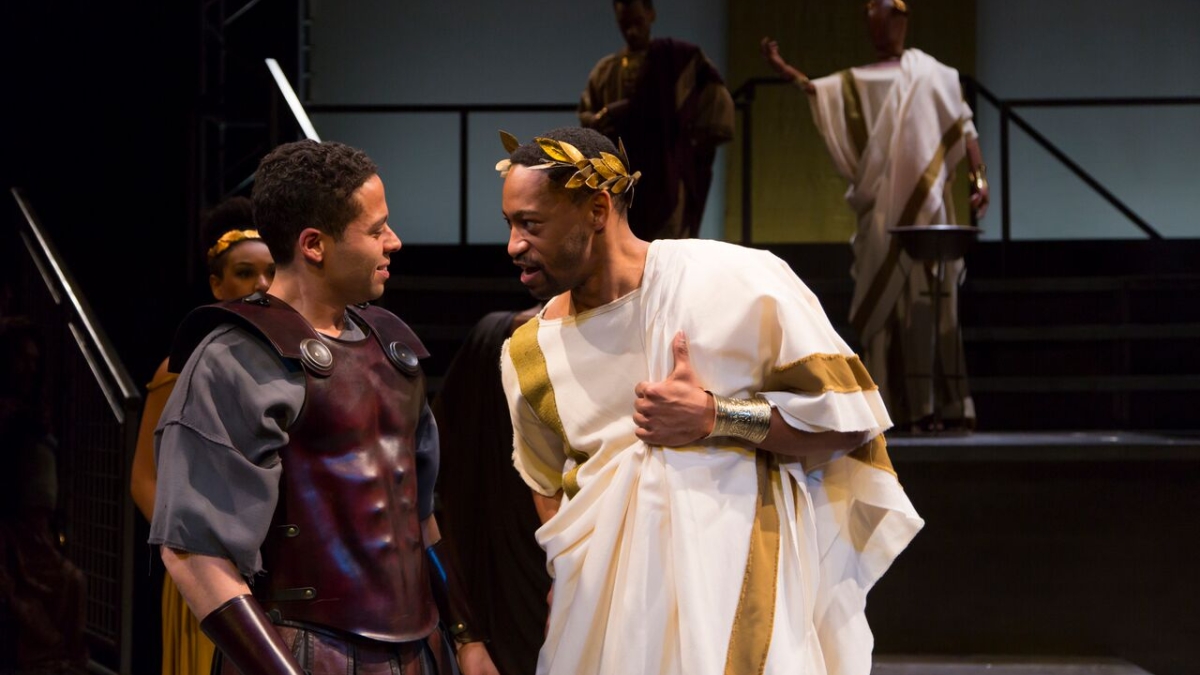At start of Black History Month, theater highlights 'our shared humanity'

Shakespeare with a cast of black actors shouldn’t be a big deal, said actor Jonathan-David.
A member of The Acting Company, a renowned New York-based theater troupe, Jonathan-David will be performing around Arizona this month in “Julius Caesar” and “X: Or, Betty Shabazz vs. The Nation,” kicking off a 15-city national tour.
“An all-white, or predominantly white, audience should be able to see these two plays by very capable actors and see that they transcend color,” he said.
Timed to Black History Month, The Acting Company will present “X” on Wednesday, a day after “Julius Caesar,” both at the Herberger Theater Center in Phoenix. From there, the group will perform at the Mesa Arts Center and Northern Arizona University before moving on to stops that include Kansas, Maryland, Missouri and New York.
Each of the 10 members of the current cast is African-American. But Jonathan-David wants audiences to see that when it comes to the arts, skin color doesn't matter. “We all deal with the same issues because of our shared humanity,” he said.
If it sounds like an obvious perspective, it’s not. Consider the backlash last year against casting a black Hermione Granger in a theatrical production of Harry Potter (author J.K. Rowling responded about the online commenters, calling them racist and saying, “With my experience of social media, I thought that idiots were going to idiot.”)
“Historically," said Neal Lester, an ASU English professor and director of Project Humanities, "some audiences can't and won't easily 'suspend their disbelief' because 'these classics have been defined as having Whites Only casts. There was colorization of these classics, including Shakespeare, in the 1930s as part of the Federal Theater Project to make these classics accessible to wider audiences. Still, many can't accept that a good story about our shared humanity is a good story, whoever it is cast.”
The Acting Company’s Arizona residency is co-sponsored by the ASU Herberger Institute for Design and the ArtsOther sponsors include the Mesa Arts Center and Northern Arizona University..
Jake Pinholster, associate dean and professor at the institute, said the company’s tour and its premiere of “X” on Feb. 1 is timely.
“Beyond these two shows — one a potentially important new work of American theater — this engagement gives us the chance to experiment with new forms of university-professional relationships, new community partners and better opportunities for our students,” he said.
The shows are part of the company’s new circuit model, centered around consortiums of universities, colleges, high schools and community organizations. In the Phoenix area, the troupe will conduct workshops, classroom visits and public forums, along with the performances.
Organizers hope to engage students, faculty and the community with opportunities to learn from the past while inviting critical dialogue about current events and social issues, artistic director Ian Belknap said.
“Repertory theater can allow for conversations to take place, and it’s a forum to learn,” Belknap said. “It can be an educational tool to fill curiosity and inspire people to examine issues in a new way.”
The Acting Company was founded in 1972 by Oscar winner John Houseman and Margot Harley from the first graduating class of the drama division of The Julliard School. It’s the only permanent, professional touring repertoryRepertory theater usually presents works from a specified repertoire or in rotation with other works. company dedicated to the development of classical actors. The Acting Company boasts launching more than 400 careers, including Kevin Kline and Patti LuPone.
Chelsea Williams as Betty Shabazz and Jimonn Cole as Malcolm X in the original play, "X: Or, Betty Shabazz vs. The Nation." Photo courtesy of T. Charles Erickson
“X,” Belknap said, required a company of black actors. He said it made sense to debut the original work about the life and assassination of Malcolm X in the Valley, since they worked on it here previously.
“Playwright Marcus Gardley and I led a play development workshop at ASU in December 2015,” Belknap said. “It was valuable to get feedback in an academic setting from theater students, who always have great ideas.”
Michael Alexander, a 25-year-old MFA student at Herberger, recalled the work session as “valuable and refreshing.”
“Actors don’t often get an opportunity to see a playwright at work,” Alexander said. “We watched the piece grow in front of our very eyes.”
He said students brainstormed several ideas with Gardley, including Malcolm X being force-fed pork in prison and taking a deeper look at the civil rights leader’s life through Betty Shabazz’s viewpoint.
That greatly appealed to Kyra Jackson, who participated in a couple of workshop sessions with Gardley.
“Strong black women usually take a back seat when it comes to civil rights history,” said Jackson, also an MFA major at Herberger. “It was not only interesting but beautiful to give her a voice.”
Top photo: Jonathan-David as Mark Antony and Gabriel Lawrence as Julius Caesar in The Acting Company's production of "Julius Caesar." Photo courtesy of T. Charles Erickson
More Arts, humanities and education

Grammy-winning producer Timbaland to headline ASU music industry conference
The Arizona State University Popular Music program’s Music Industry Career Conference is set to provide students with exposure to exciting career opportunities, music professionals and industry…

ASU Gammage brings the best of Broadway to the 2025–26 season
ASU Gammage has announced its 2025–2026 Desert Financial Broadway Across America-Arizona season with a lineup of Broadway shows that includes a mix of new productions, classics and comedies. “…

March Mammal Madness hypes science, storytelling in the classroom and beyond
In classrooms throughout the country, the buzz around March Mammal Madness starts long before the tournament begins. For middle school science teacher Jessica Harris, students wonder which…


